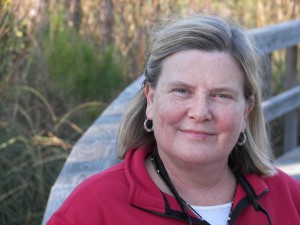Honoring Hilmes: Curious Mentoring
 This is the second post in our “Honoring Hilmes” series, celebrating the career and legacy of Michele Hilmes on the occasion of her retirement.
This is the second post in our “Honoring Hilmes” series, celebrating the career and legacy of Michele Hilmes on the occasion of her retirement.
Post by Ben Aslinger, Bentley University
Much will be said of Michele Hilmes’ internationally known and known to rock a microphone scholarship, but in honor of her commitment to advising and mentorship, I’d like to focus on how Michele’s intellectual curiosity and willingness to mentor a diverse array of projects has helped so many of us find our academic voices, establish our careers, and refine the goals of professorial life. Without a doubt, Michele has trained a veritable army of media studies scholars, whose institutional affiliations and academic interests span the globe as well as a range of disciplinary and interdisciplinary pursuits.
 In this post, I focus on three moments from my own interactions with Michele. About halfway through my dissertation, I walked into Michele’s office in a panic. I had been reading a lot of work in queer popular music studies and queer musicology, and everyone was referencing Adorno. “Do I need to read Adorno’s corpus to finish this dissertation chapter?,” I asked with more than a little anxiousness. Without missing a beat, Michele responded, “No.” I knew that Michele did not mean that Adorno’s work wasn’t valuable. She saved me from going down a rabbit hole, a detour that would have taken me a month or more and that might have added little to the dissertation chapter that needed to be finished. And pulling someone back from the rabbit hole is what good advisors as well as colleagues and friends do.
In this post, I focus on three moments from my own interactions with Michele. About halfway through my dissertation, I walked into Michele’s office in a panic. I had been reading a lot of work in queer popular music studies and queer musicology, and everyone was referencing Adorno. “Do I need to read Adorno’s corpus to finish this dissertation chapter?,” I asked with more than a little anxiousness. Without missing a beat, Michele responded, “No.” I knew that Michele did not mean that Adorno’s work wasn’t valuable. She saved me from going down a rabbit hole, a detour that would have taken me a month or more and that might have added little to the dissertation chapter that needed to be finished. And pulling someone back from the rabbit hole is what good advisors as well as colleagues and friends do.
Another moment. Dropping off a dissertation chapter at her condo, Michele invited me in for a cup of coffee. Over conversation, she related an anecdote about a recent tenure case she had reviewed. She never revealed the name or any other details, ever being the ethical professor; she simply stated, “Everybody thinks that you have to write that much. You don’t have to write that much. You just have to write enough to get tenure and to get full.” This past year, those words have come back to me, as I and so many of my friends struggle to articulate for ourselves what a sustainable academic career is and how to be happier in our scholarly pursuits even as the neoliberal corporate university seems to demand ever more of us.
A final, recurrent moment. In response to some of our graduate school disidentifications with the label “media historian,” Michele persistently reminded us that regardless of the labels that might be attached to us as scholars or that we might attach to ourselves, that we are all historians. The continual reminder to historicize stays with me even though many of the texts and phenomena I study are contemporary.
Our doctoral experiences are obviously individual and idiosyncratic, so I invite Michele’s numerous advisees to chime in below with their memories to provide further evidence of how Michele provided us a model of mentorship that was compassionate, dedicated, and demanding and that modeled intellectual promiscuity and curiosity in the best sense. And knowing that mentorship isn’t confined to the department, in the spirit of “Honoring Hilmes,” I invite those outside the Madison orbit to share their stories too!



I love these stories, Ben, because they are indeed reflective of the Michele Hilmes I, too, have known and loved. Here’s one of my favorite Michele stories, illustrating how much I learned from her as a teacher.
Late in my graduate career, I wrote a paper for Michele that I was pretty pleased with. I later discovered that she was…um…shall we say…less pleased. In the feedback I received, it was clear that I had substantially underperformed, despite my best intentions (but admittedly not my best efforts). I was HUMILIATED. Not because I’d performed badly, but because I’d performed badly for Michele. I had let her down. I could have done better, she knew it, and I knew it, and now I knew that she knew it. It was then that I realized how much more powerful a teacher could be by inspiring her students to work up to their potential–not by shaming them, or by yelling, but by encouraging their respect and admiration and affection.
Even more powerful, when I went to her office to discuss the paper and project, it was very clear that I was completely chagrined and embarrassed. Michele took one look at me, got out the box of Kleenex she always keeps in the drawer, and said, “Listen. I was probably harsher in that feedback than I should have been. It was a long week of reading and responding and grading.” That humility on her part–not to apologize for the feedback (which was fair), but to admit that maybe she could have delivered it more kindly, showed me that a well-placed apology not only doesn’t make you appear weak, but can make you appear stronger.
Thanks, Michele–I am so grateful for your mentorship and friendship.